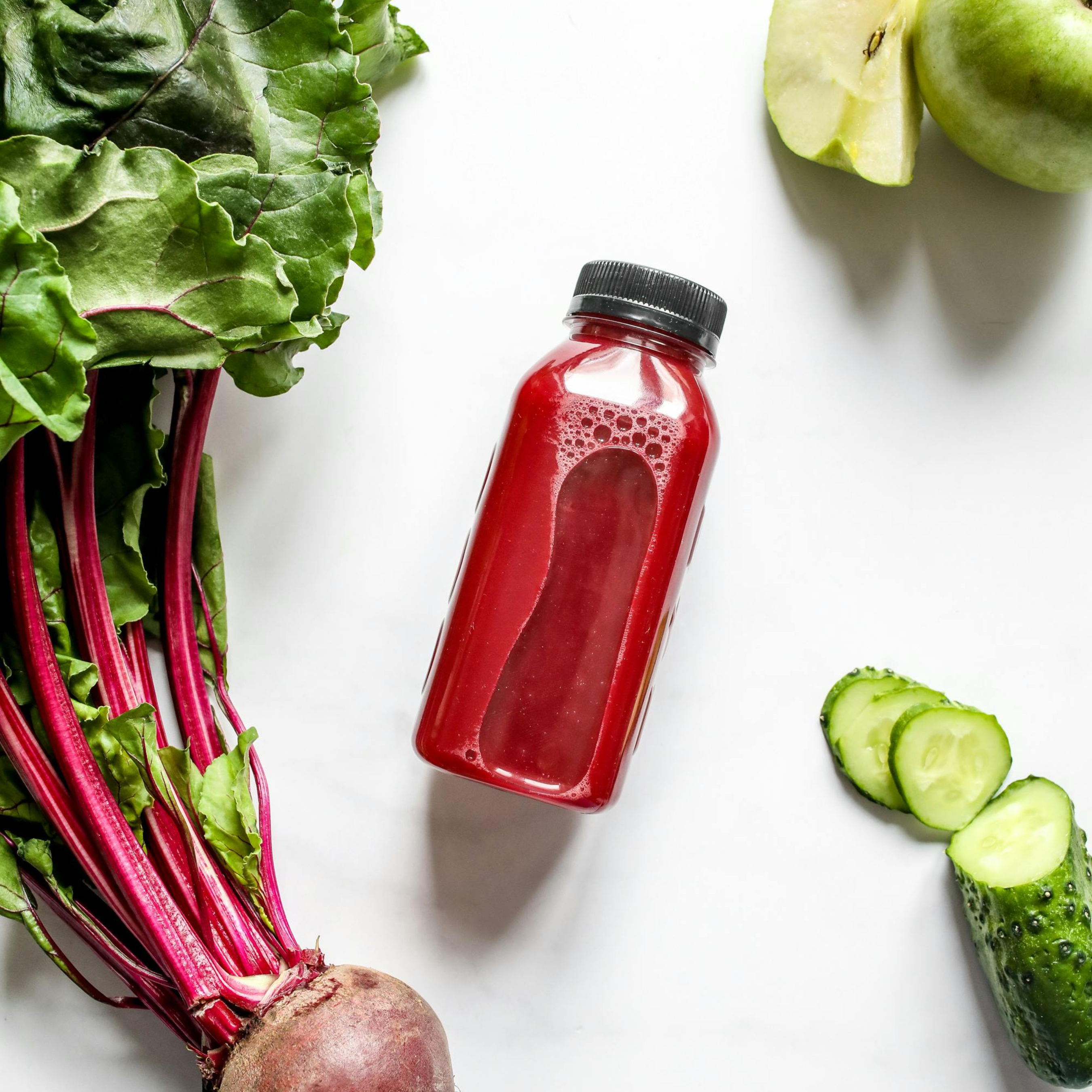What is AMH? And Can You Improve It Through Diet & Supplementation?
If you're exploring your fertility, you've likely come across the term AMH. But what exactly is it, and what does it reveal about your reproductive health? Let's delve into the science and significance of AMH.

What is AMH?
AMH stands for Anti-Müllerian Hormone, a protein hormone produced by cells in your ovaries. Specifically, AMH is released by the granulosa cells of preantral and small antral follicles in the ovaries. Follicles are little ‘sacs’ in your ovaries that contain an immature egg.
The preantral and small antral follicles are kind of in the mid-tier of development; they’re growing but not fully matured to the point of ovulation. They actually release AMH as a way to regulate the growth of more follicles - AMH is a gatekeeper to ensure you don’t grow all your eggs at once and end up with octuplets!
Because of the way that AMH is produced, it makes quite a useful marker for estimating your ovarian reserve - the approximate number of eggs remaining in your ovaries. This is why you will often hear AMH referred to as the “egg count test” or “egg timer test”. Your AMH level correlates with the number of these small, growing follicles.

AMH's role in the body
In Early Life
We know you’re probably here to understand how AMH relates to your egg count, but hold on just one sec.
Did you know that males actually start their lives producing way more AMH than females?
AMH plays a crucial role in a very newly developing foetus by preventing the development of female reproductive structures, and guiding the formation of male reproductive organs.
In females, AMH levels are low at birth but increase during childhood, reflecting the growth and development of ovarian follicles.
In Adult Females
In adult females, AMH is made by developing follicles to regulate growth over your reproductive years, ensuring that only a select few follicles grow during each menstrual cycle.
AMH levels typically peak in early adulthood and gradually decline with age, which then reflects the natural decrease in egg reserve over time (something that we are frequently reminded of, we know we know!).

AMH and Reproductive Health
AMH testing is commonly used in fertility assessments to estimate ovarian reserve i.e. egg reserve. It can provide valuable information when considering options like egg freezing or in vitro fertilisation (IVF) and helps your medical team decide on the appropriate medications and doses to use.
However, it's important to note that AMH levels do not predict the ability to conceive naturally or the quality of the eggs. They offer a snapshot of quantity, not quality.
Limitations of AMH testing
While AMH testing is a useful tool, it has its limitations:
- Not a fertility crystal ball: AMH levels alone cannot predict the likelihood of natural conception.
- Doesn't give an indication of your egg quality: high AMH levels don't guarantee healthy eggs, and low levels don't necessarily mean poor egg quality.
- Can be influenced by external factors: certain medical conditions such as endometriosis and autoimmune diseases, certain cancers as well as medications, dietary and lifestyle factors can affect AMH levels, potentially skewing results.
- Sensitive to Vitamin D & Biotin: vitamin D deficiency affects about 1 in 4 Australians, if you’re low in vitamin D at the time of testing, you may get a falsely lowered AMH. Conversely, taking a hair, skin and nails supplement? The nutrient biotin is likely on the back of the label, a common B vitamin, and that can falsely elevate your AMH levels.
- Difference in assays between testing companies: different laboratories may use varying assays, leading to inconsistent results (just in case you get it tested in a different place and the number seems wildly different - chat to your healthcare provider).
Factors Affecting AMH Levels
Several factors can influence AMH levels:
- Age: although not all changes in AMH levels are explained completely by age, we do know that typically one of the most significant factors affecting AMH for most people will be their age. AMH levels naturally decline with age, reflecting a decrease in ovarian reserve.
- Medical conditions: certain medication conditions can sometimes quite significantly affect your AMH level! For example, polycystic ovary syndrome (PCOS) is often associated with a higher-than-expected AMH level. Other conditions including endometriosis and autoimmune diseases, may lower AMH levels.
- Lifestyle factors: some research has identified a link between smoking and/or vaping and a low AMH level. Another (perhaps unexpected!) factor affecting AMH levels is vitamin D deficiency, which may lead to an inaccurate AMH test result - so it can be (very) handy to have your vitamin D checked at the same time.
- Medications: hormonal contraceptives such as the oral contraceptive pill can temporarily lower AMH levels, so it’s important to discuss your medications with your healthcare provider at the time of testing.
Is there anything I can change to increase my AMH level?
We get this question a lot, and we totally get why. But here’s the science-backed truth: there’s no food or diet or supplement that can increase your AMH level or ovarian reserve.
Your AMH reflects the number of developing follicles in your ovaries at a given time, so it’s more about what’s already there than something you can build up through diet. Unfortunately, we are born with all the eggs we will ever have and they decline over time, scientists are yet to work out how to make new ones.
Vitamin D may affect your AMH test results, but this doesn’t mean it’s increasing the number of eggs you have, it’s just influencing how your results show up. So if you’re testing, especially with low vitamin D levels, it’s worth flagging with your healthcare provider.

That said, your diet can impact the long-term health of your ovarian reserve.
A 2022 study found that dietary patterns high in fast food, poor-quality fats, and processed foods were associated with lower AMH levels and diminished ovarian reserve. That doesn’t mean the odd burger night is sabotaging your fertility, but it’s a reminder that a balanced, nutrient-rich diet (with quality fats, fibre, and antioxidants) can help preserve your reproductive health over time.
So no, you can’t “boost” your AMH, but you can take care of your overall fertility health through your diet and lifestyle choices.
AMH: Just One Piece of the Fertility Puzzle
AMH testing can potentially offer valuable insights into your ovarian reserve, but should be interpreted within the broader context of overall reproductive health. It's one piece of the fertility puzzle, not the whole picture. AMH testing does not predict how easily you will conceive nor does it tell you anything about the quality of those growing follicles!
Consulting with an experienced healthcare provider can help you understand what your AMH levels mean for your individual circumstances and guide you in making informed decisions about your reproductive health.
References
Alesi, R., Venturella, R., Massimino, M., Sacchinelli, A., Morelli, M., Zullo, F., & Gullo, G. (2021). Does vitamin D supplementation improve ovarian reserve in women with diminished ovarian reserve and vitamin D deficiency: A before-and-after intervention study. BMC Endocrine Disorders, 21(1), 1–8. https://doi.org/10.1186/s12902-021-00740-5
Digiulio, D. B., & Horton, R. (2020). Ovarian reserve testing: A user’s guide. American Journal of Obstetrics & Gynecology. https://doi.org/10.1016/j.ajog.2020.08.001
Elwazzan, M., Abumaghaid, M., Heffernan, M., & Rahman, M. S. (2023). P-697 The effect of smoking and vaping on hormonal ovarian reserve markers in women of reproductive age in the United Kingdom. Fertility and Sterility, 120(3), e514. https://doi.org/10.1016/j.fertnstert.2023.07.705
Kermack, A. J., Low, N., & Wall, M. (2021). The role of anti-Müllerian hormone testing for fertility prognosis. British Columbia Medical Journal, 63(3), 120–125. https://bcmj.org/articles/role-anti-m%C3%BCllerian-hormone-testing-fertility-prognosis
Kowalcek, I., Ludwig, M., & Findeklee, S. (2020). The physiology and clinical utility of anti-Mullerian hormone in women. Gynecological Endocrinology, 36(4), 285–290. https://doi.org/10.1080/09513590.2019.1650800
Moy, V., Jindal, S., Lieman, H., & Buyuk, E. (2010). The impact of smoking on antimüllerian hormone levels in women aged 38 to 50 years. Fertility and Sterility, 93(6), 2158–2162. https://doi.org/10.1016/j.fertnstert.2008.12.087
Rudick, B. J., Ingles, S. A., Chung, K., Stanczyk, F. Z., Paulson, R. J., & Bendikson, K. A. (2012). Anti-Müllerian hormone (AMH) in relation to tobacco and marijuana use and sources of indoor heating/cooking. Fertility and Sterility, 98(1), 181–187. https://doi.org/10.1016/j.fertnstert.2012.03.050
Skaznik-Wikiel, M. E., & Shu, Y. (2019). Infertile women below the age of 40 have similar anti-Müllerian hormone levels and antral follicle count compared with women of the same age with no history of infertility. Fertility and Sterility, 112(3), 551–558. https://doi.org/10.1016/j.fertnstert.2019.05.004
Zhang, M., He, X., Xu, Q., Chen, B., & Wu, Y. (2020). The association between vitamin D and anti-Müllerian hormone: A systematic review and meta-analysis. Reproductive Biology and Endocrinology, 18, Article 69. https://doi.org/10.1186/s12958-020-00628-9
Zhang, Y., Wang, Y., He, Y., & Wu, Y. (2021). Effects of vitamin D supplementation on ovarian reserve markers in infertile women with diminished ovarian reserve. Journal of Ovarian Research, 14(1), 1–9. https://doi.org/10.1186/s13048-021-00817-7
Zhou, Y., Zhang, J., Xu, H., Xia, W., & Sun, X. (2022). Dietary patterns are associated with improved ovarian reserve in overweight and obese women: A cross-sectional study of the Lifestyle and Ovarian Reserve (LORe) cohort. Reproductive Biology and Endocrinology, 20(1), Article 17. https://doi.org/10.1186/s12958-022-00899-4




